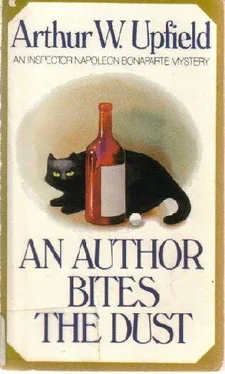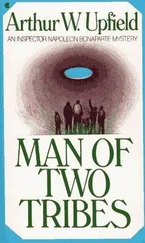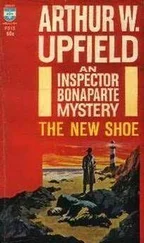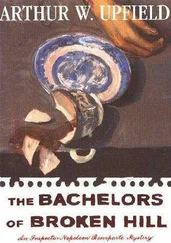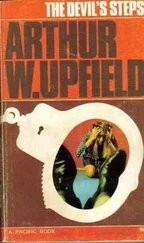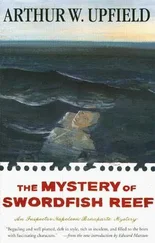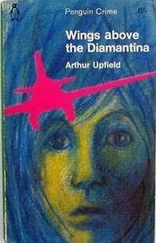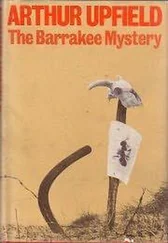Arthur Upfield - An Author Bites the Dust
Здесь есть возможность читать онлайн «Arthur Upfield - An Author Bites the Dust» весь текст электронной книги совершенно бесплатно (целиком полную версию без сокращений). В некоторых случаях можно слушать аудио, скачать через торрент в формате fb2 и присутствует краткое содержание. Жанр: Классический детектив, на английском языке. Описание произведения, (предисловие) а так же отзывы посетителей доступны на портале библиотеки ЛибКат.
- Название:An Author Bites the Dust
- Автор:
- Жанр:
- Год:неизвестен
- ISBN:нет данных
- Рейтинг книги:5 / 5. Голосов: 1
-
Избранное:Добавить в избранное
- Отзывы:
-
Ваша оценка:
- 100
- 1
- 2
- 3
- 4
- 5
An Author Bites the Dust: краткое содержание, описание и аннотация
Предлагаем к чтению аннотацию, описание, краткое содержание или предисловие (зависит от того, что написал сам автор книги «An Author Bites the Dust»). Если вы не нашли необходимую информацию о книге — напишите в комментариях, мы постараемся отыскать её.
An Author Bites the Dust — читать онлайн бесплатно полную книгу (весь текст) целиком
Ниже представлен текст книги, разбитый по страницам. Система сохранения места последней прочитанной страницы, позволяет с удобством читать онлайн бесплатно книгу «An Author Bites the Dust», без необходимости каждый раз заново искать на чём Вы остановились. Поставьте закладку, и сможете в любой момент перейти на страницу, на которой закончили чтение.
Интервал:
Закладка:
Arthur W. Upfield
An Author Bites the Dust
Chapter One
The Great Mervyn Blake
THE large room rented by the Australian Society of Creative Writers for its bi-monthlymeetings was comfortably filled on the afternoon of 7th November. The Society was fairly strong and quite influential, for many of its members had arrived in the local world of belles-lettres and its president was the well-known Mervyn Blake, novelist and critic.
He was the chief speaker this afternoon, and he spoke with the assurance of the successful. His speech began shortly after tea, which was served at half past three, and it finished at four minutes to five, being followed by polite hand-clapping. At five o’clock he left the building in company with Miss Nancy Chesterfield, the socialeditress of theRecorder.
Blake’s age was somewhere in the early fifties. He was large but not fat, florid of face but not flaccid of muscle, and his over-long hair still matched the colour of his dark-brown eyes. He carried his years exceptionally well, for Prosperity riding on one shoulder and Success on the other kept those shoulders well back.
“Glad you were able to make the grade this afternoon,” he said when he and Nancy Chesterfield were walking along Collins Street to the Hotel Australia. “Do we pick up your case at your office?”
“Yes, please, Mervyn. I left it with the commissionaire so there’ll be no need to go up for it. My compliments on your speech. But-”
“But what?”
“I wonder. Do you think if the modern novelist turned out his wares similar in length and scope and digression to, say, the novels of Sir Walter Scott and Thackeray, that they would be acceptable to modern publishers?”
“No, most certainly not. Modern publishers have to and do pander to the demands of the modern and now comparatively educated herd. Old time publishers took pride in their part of the production of fine literature. Nowadays they demand sensationalism slickly put across, for their shareholders must be given their pound of flesh. Anyway, it’s a heck of a dry argument, and at the moment I’m sick of telling the would-be great how to write novels. And I am sick of literary people-which is one reason why I had Janet to ask you out for the night.”
“Bored with your house party?” she asked when they came together again in the crowd on the footpath.
“The boredom even brandy won’t dispel.”
They did not speak again until they had relaxed in one of the lounges of the famous hotel. Then he ordered gin and vermouth for his companion and brandy and dry ginger ale for himself. She noted that he called for a double for himself.
“What were the other reasons you used to persuade Janet to invite me?” she asked. He drank the brandy as though it were a light beer and signalled to the waiter.
“The mirror in your bag will provide one of the reasons,” he said. “I wish I weren’t old. I wish I weren’t married. I wish I were your age and yet in possession of all the experiences and the success I have today. Dammit! No sooner do we reach the top than we are old and able to enjoy only-brandy. A double, please, waiter. The lady will miss out this time.”
“And the other reasons?” pressed Nancy Chesterfield. Dressed in a beautifully tailored black suit and pale green blouse with a fashionable black hat emphasizing the brilliance of her almost golden hair, she would have made any man proud to be her cavalier.
“Another is that I want you to give a full report of what I said this afternoon. Publicity is an author’s very breath of life,” he said with brutal candour made charming by the way he smiled. The second double brandy had been set before him and he drank it quickly, then said, “That’s better. Again, waiter, and another gin and vermouth. Been on the wagon, Nancy, since before lunch. A week-end party is quite all right, but one that goes on for a week becomes very wearing. I’m glad they didn’t want any encouragement to stay put. I didn’t want them with me. Marshall Ellis is a bore, and I am unable to understand why his face hasn’t been pushed in long ago. Wilcannia-Smythe gets under my skin at times. Lubers is a humourless iconoclast whom I find irritating, and Ella is exceedingly depressing after twenty-four hours. That leaves Twyford Arundal, who is really amusing when he’s properly drunk. Janet has been a little difficult, and I have been boozing too much.”
“Quite a tale of woe. Poor old Mervyn! Never mind. Janet likes having people about her, and the end of the house party is in sight, isn’t it?”
“Yes. Of course, I’m with Janet up to a point. One must mix. One must use people, especially influential people, and the lion of the moment is decidedly influential in London. Make no mistake, I use you, too, but then in my own fashion I’m fond of you. Your coming home with me will save my reason. Your glass is empty.”
They left the Australia at five minutes past six and proceeded to a car park for Blake’s car. Nancy Chesterfield suggested that she should drive, but that proposal he put aside. The evidence of his condition was not manifest in his gait, nor at first did it become manifest in his driving. His voice betrayed it to her. He spoke now very slowly and distinctly, with an accent he fondly thought was genuine Oxford.
Having called for her case, he drove with excessive caution till they were beyond the tram terminus, and then raised the speed so high that she had to remonstrate with him.
“My dear Nancy, we’re not driving in a T-model Ford. My nerves are steady. My eyes are wide open.”
“But my nerves are not particularly good today. I had a hectic morning with the Chief,” she told him.
“Indeed! You astonish me,” he said. “No one but creative writersare entitled to nerves. If this old dame in front doesn’t get clear in two seconds she is going to cop it, as the vulgar would say.”
However, thereafter he drove with moderate speed and care the remaining thirty odd miles to Yarrabo, again being exceedingly cautious when passing loaded timber trucks coming in from the distant mountains. Just after entering Yarrabo they left the highway for a branch road and then passed through a double gateway giving access to a spacious garden in which stood a spacious house.
In the hall they were welcomed by Mrs Blake and Mrs Ella Montrose.
“It’s so good of you to come, Nancy,” Janet Blake exclaimed, warmly. “Ella and I have become bored with each other, and even the men are getting tired of us. Come along! I am putting you in my room. Ella will bring you a cup of tea while you are dressing. There isn’t much time. Mervyn should have brought you hours ago.”
“We gossiped after the meeting,” Nancy Chesterfield explained, following her hostess from the hall. Behind her she heard Mrs Montrose tell Mervyn Blake that his evening milk had been taken to his writing-room, and she was aware that Blake always drank milk after a “heavy” afternoon that he could take a “heavy” evening the better.
The dinner was an informal affair. Everyone had long known each other excepting Marshall Ellis, the visitor from England. TheBlakes were noted for their hospitality to literary folk, and at this time they were blessed with the services of an excellent cook and a maid with a personality. The room, the table appointments, and the efficient service made a combination altogether pleasing.
Eight people sat at the board, Mervyn Blake, well groomed, sober, and mentally alert, occupying the head of the table. On his right sat the guest of honour, Mr Marshall Ellis, one of London’s leading literary critics, Nancy Chesterfield did not like him, but forbore to condemn him merely for his imitation of G. K. Chesterton. The imitation proceeded no further than the paunch, the hair fashion and the pince-nez with its attachment of broad, black ribbon. The face was like that of a punch-drunk Liverpool Irishman, but the voice was the most melodious male voice she had ever heard.
Читать дальшеИнтервал:
Закладка:
Похожие книги на «An Author Bites the Dust»
Представляем Вашему вниманию похожие книги на «An Author Bites the Dust» списком для выбора. Мы отобрали схожую по названию и смыслу литературу в надежде предоставить читателям больше вариантов отыскать новые, интересные, ещё непрочитанные произведения.
Обсуждение, отзывы о книге «An Author Bites the Dust» и просто собственные мнения читателей. Оставьте ваши комментарии, напишите, что Вы думаете о произведении, его смысле или главных героях. Укажите что конкретно понравилось, а что нет, и почему Вы так считаете.
